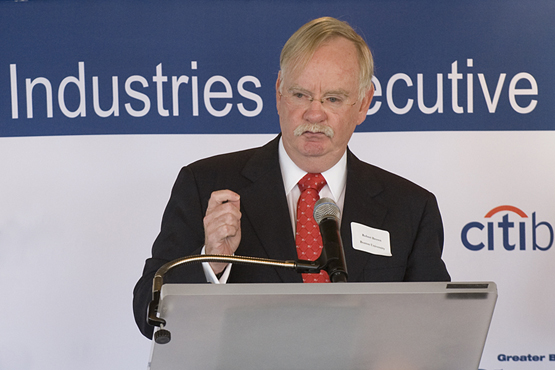BU President Says Young Grads Are Key to Boston’s Future
Urges businesses to work with universities

Boston’s prosperity depends on the ability of local universities and businesses to work together to create an environment that will persuade graduates to remain in the area, BU President Robert A. Brown told a group of business leaders last week.
For this to happen,” said Brown, speaking at the Greater Boston Chamber of Commerce Leading Industries Executive Forum, “attractive jobs must exist across all sectors. Our challenge is to work together to identify the educational backgrounds needed by you companies in the next decades.”
Brown warned the audience that other regions of the United States, as well as other countries, “are not sitting still, but are working to create programs and policies that will attract jobs and the people who can best fill them.”
Brown also stressed the need to make Boston a more livable city. He urged business leaders to support BU’s proposal for the construction of a new transportation hub near the BU Bridge, which could alleviate many of the traffic problems that plague the area.
“We have a plan that would transform the mangled intersection,” said Brown. “We believe that working with the city, the state, and other institutions, we can turn that concrete wasteland into a pedestrian-friendly intersection, complete with green spaces, and construct a major new transportation hub that would serve the region.”
Brown pushed for greater collaboration between “institutions along the Charles River.” Citing the success of genomic research conducted at the Broad Institute, a collaboration of MIT, Harvard, and the Harvard teaching hospitals, Brown said he had hopes for similar success for the research into infectious diseases that will be conducted at the National Emerging Infectious Diseases Laboratories (NEIDL), which is nearing completion on the BU Medical Campus.
“The NEIDL is designed to be a state-of-the-art facility for conducting research that will find the means to prevent and cure diseases such as dengue fever and others that can be passed either from human to human or through insects and animals and that can hop continents thanks to modern travel. We like to think of these diseases as someone else’s issue, but it’s only a matter of time before they arrive in the United States. Research is the only answer.”
Brown said he was confident that Boston’s greater life sciences community is positioned to become a global leader in research into the causes and cures of infectious diseases. “In years to come,” he said, “we will herald this leadership as a critically important contribution by the institutions of the Charles River Basin to global health.”
Art Jahnke can be reached at jahnke@bu.edu.
Comments & Discussion
Boston University moderates comments to facilitate an informed, substantive, civil conversation. Abusive, profane, self-promotional, misleading, incoherent or off-topic comments will be rejected. Moderators are staffed during regular business hours (EST) and can only accept comments written in English. Statistics or facts must include a citation or a link to the citation.